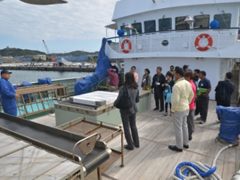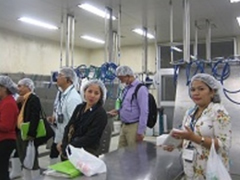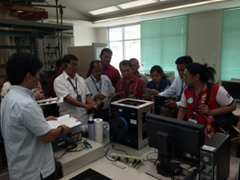Project News
2015-10-24
Training in Japan (2nd. year)
From Oct 12 to 24, 2015, training in Japan was conducted under the title of "Technical Education in High Schools in Japan". 14 participants were invited to Japan: 2 officials from Department of Education, and 2 from each of the 6 model schools (a principal and teacher in charge of industry linkage) .
During the training, the participants attended lectures on education in Japan and on the Japanese technical education system. They also observed high schools and related institutions in Japan. They visited 1 technical high school, 2 high schools of fisheries, and 2 agricultural high schools in Chiba and Okinawa prefectures according to the participants' specializations.
Generally in the Philippines, students take practicum in their schools or in companies (the system is called ‘work immersion'), and they learn how to apply the knowledge and skills they have acquired to actual situations. However, it has been difficult for the school to find industry partners. In addition, even though the companies accept the students for work immersion, they do not always set up appropriate conditions where the students can use the knowledge and skills obtained in the school.
Through the training in Japan, the participants found one clue towards solving the issue above: that is, Project Study[1]. This employs a different educational style from work immersion because the students focus on learning the existing practice of the company. In Project Study, students discuss how to apply their acquired knowledge and skills to daily life, and plan and implement one project a group. Many participants were impressed by the method (subject).
The Project study method... [and] serving the community along with the results of studies/projects and activities [were very impressive]. ... The realistic or industry type learning exposures would give more skills and confidence to the students.
(Mr. Calabazaron, Principal, Bukig National Agricultural Technical School)
Mr. Calabazaron, is currently working on a Competitive Gant Project, in which the school is provided with a tractor and plans to cultivate a 20 ha cassava farm. He mentioned that he would apply the Project Study method to his school and let the students discuss in groups how to utilize the harvested cassava in the school farm. The other participants also mentioned their plans to introduce the method to their schools. It is a new educational method for the students to apply their knowledge and skills in practical situations in the Philippines.
In addition to the education in Japan, many participants expressed a favorable impression on Japan in their questionnaire sheet. For example,
My experience in Japan cannot be paid by money. I am very thankful to JICA for giving me the opportunity to come and discover Japan. Without JICA I won't be here. I have gained lots of insights, especially in the field of education. Not only Japan is very advanced in terms of technology, but also I am amazed by their attitude. Japanese are very kind, sincere, passionate, disciplined and that is why Japan is very progressive.
(Ms. Casas, Master Teacher, Rogongon Agricultural High School)
Thanks to a great deal of hospitality shown by the lecturers and organizations who supported the training, and the Japanese people that the participants have met, all the participants were satisfied with the training when they returned to the Philippines.
 Tateyama Sougou High School, Chiba
Tateyama Sougou High School, Chiba
 Okinawa Fisheries High School, Okinawa
Okinawa Fisheries High School, Okinawa
 Okinawa Prefectural Education Center, Okinawa
Okinawa Prefectural Education Center, Okinawa
Note
- [1] For example an agricultural school, Project Study is a lesson in which students set the theme of the project based on their own interest or career view and are given the opportunity to present the results of the project. The project could be: 1) conducting study/research/experiment, 2) making some works, 3) involving practicum in industry situation, 4) acquiring vocational certificate, or 5) implementing activities related to School Agricultural Club.
- About JICA
- News & Features
- Countries & Regions
- Our Work
- Thematic Issues
- Types of Assistance
- Partnerships with Other Development Partners
- Climate Change / Environmental and Social Considerations
- Evaluations
- Compliance and Anti-corruption
- Science and Technology Cooperation on Global Issues
- Research
- JICA Development Studies Program / JICA Chair
- Support for the Acceptance of Foreign HRs / Multicultural and Inclusive Community
- Publications
- Investor Relations
